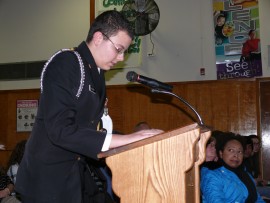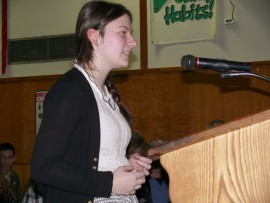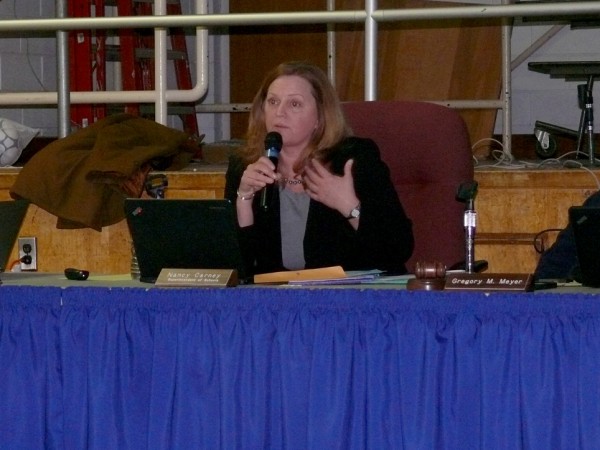We want more school, not less. That’s what more than four dozen students came to tell the Board of Education Tuesday night.
“Never before have we been faced with such an issue that will affect the quality of our education,” said Nicholas Waldron, the high school junior who organized the student gathering at the Riverhead Board of Education meeting. The students waited nearly two hours for their opportunity to express their concerns, often emotionally, about the high school’s change from nine periods to eight periods this school year.
The concerns stem from students who have schedules so full they are unable to schedule a lunch period. They opt to forgo lunch in order to fit an elective into their schedule.
A majority of the students in attendance were members of the Riverhead NJROTC. Riverhead’s NJROTC unit is experiencing diminishing enrollment because of the schedule change, Nicholas said.
 “Within the next three years it is very likely that the NJROTC program will cease to exist here at the Riverhead High School,” he said. “Our numbers have already dropped by 17 percent and are continuing to fall. Once that unit falls below 100 cadets, it is susceptible for de-establishment by the U.S. Navy. Once that unit is gone, we cannot return,” Nicholas explained before a packed audience.
“Within the next three years it is very likely that the NJROTC program will cease to exist here at the Riverhead High School,” he said. “Our numbers have already dropped by 17 percent and are continuing to fall. Once that unit falls below 100 cadets, it is susceptible for de-establishment by the U.S. Navy. Once that unit is gone, we cannot return,” Nicholas explained before a packed audience.
His sentiments were echoed by many of the students who followed him to the podium.
“What is the point of spending so much money building a ROTC room if in a few years time it isn’t going to be there any more?” questioned high school student Kevin Ruano.
He also said music enrollments have declined. Participation in freshman band has dropped 30 percent, freshman orchestra 32 percent and music theory 85 percent, according to Kevin.
Students told board members they can’t fit music into their already tight schedules.
“Many of the students have to have orchestra every other day. That’s ridiculous, you cannot keep up with how hard some of the pieces we are playing with the other students. You fall behind,” said sophomore Shannon Zeltmann. “You cannot play an instrument and have band, or orchestra or chorus every other day.”
“The kids who take music part of the week are not able to catch up, it is not possible to have a functioning choir or band or orchestra with a student who only practices three days a week – at the level the conductors want them to be at. It’s just not possible,” high school senior Mia Salgado said.
Emotions ran high as students relayed their individual experiences having to give up lunch in order to better compete in the ever more competitive world of college acceptances.
 “This year I have been very affected by this eight-period day,” Shannon said. “First off, I have no lunch period. I am in an AP physics class with 16 students, and only 2 students in that class actually have a lunch period. The rest of us eat our lunch in that class,” she said. “Everybody needs a lunch to wind down from this rigorous seven-hour day we have.”
“This year I have been very affected by this eight-period day,” Shannon said. “First off, I have no lunch period. I am in an AP physics class with 16 students, and only 2 students in that class actually have a lunch period. The rest of us eat our lunch in that class,” she said. “Everybody needs a lunch to wind down from this rigorous seven-hour day we have.”
Ashley Brenner expressed her frustration “as an IEP student with resource room, and music and NJROTC.” She is not able to have lunch. “I am eating granola bars through the day to keep my nutrition up and trying to have something in my system. Not having a lunch affects me because staying after school until 5, I am starving, just drinking water all day and eating granola bars, that’s not enough. Having a sandwich or a salad during that day instead of granola bars would have such a major effect. But, with ROTC and music, when am I supposed to eat?”
The issue of students not having lunch was a major impetus for moving from an eight period day to a nine period day in the past — and at that time many parents complained about that change School Superintendent Nancy Carney explained.
“The high school had an eight-period day actually when I first came here a number of years ago and we went to a nine-period day at that point because many kids did not have a lunch period during their schedule and we thought it was very important that kids had lunch periods,” Carney said.
The decision was made to go back to an eight-period day due to the number of students in study halls, Carney said.
Nicholas Waldron said he thought fiscal considerations prompted the move. But Assistant Superintendent David Wicks said, “It really wasn’t much about the cost savings.”
 He described the real concerns as “two-fold.” One was the number of students “sitting in study halls” that had “no real structure or educational benefit.” An eight-period day would reduce the number of students in study hall periods and also add about seven minutes to each of the remaining eight periods, he said.
He described the real concerns as “two-fold.” One was the number of students “sitting in study halls” that had “no real structure or educational benefit.” An eight-period day would reduce the number of students in study hall periods and also add about seven minutes to each of the remaining eight periods, he said.
Students were skeptical of the assistant superintendent’s explanation.
“The students who took study halls before are still taking study halls,” Mia said. “The eight-period-day only hurts students who care about their education,” she added.
“I’m not even a high schooler yet, I’m a future freshman,” said 8th-grader Olivia Bozuhoski. “Are you going let lazy, non-caring kids, people who are choosing to be in study halls three periods a day, are you going to let them decide how my schedule is going to work out?” she asked.
Sophomore Kyle Oak added, “The people who don’t want to succeed or move up in their lives are going to stay where they are.”
Lori Downs of Riverhead, longtime board observer who ran for a school board seat last year, said if the district is concerned about students having too many study halls, it should have a rule limiting students to one study hall period per day.
High school parent Roy Vasquez questioned whether the administration explored other solutions to the problem of too many study halls before deciding to eliminate the ninth period.
“What were your other solutions?” Vasquez said. “Was this the best solution? I would like to know what the other ideas you came up with. I’d just like to know if this is the only one. I ask the question because it just sounds to me like you took the easy way out. That’s what that sounds like to me.”
The superintendent said decisions like this are not made lightly. After the tax cap came into effect, Riverhead had to cut staff, she said. Adding classes is difficult if you don’t have the staff to cover the classes and “you can’t just add staff,” Carney said.

“Sometimes kids have to make choices. It’s part of life,” Carney said. “‘I can do this now, we have to do that later. I take this elective now, may have to take it in a year.’ This is what life is about – having discussions. If something is not working and it’s not helping kids, then we need to look at it to see what we can do differently. This was brought to the board of education and to me by the high school administration, which was dealing with trying to make things work at the high school in a way that was efficient and meeting the needs of as many kids as you can meet. As we do,” she added.
“I think this is a conversation that we need to continue,” Carney said. “I will bring all of these concerns to the high school administration, and we will brainstorm other options.
“This is a time when we have to start thinking outside the box, how can we do things differently, how can we work individually with the kids to get them what they want to have between 9th grade and 12th grade,” Carney said.
Parents want to have the opportunity to discuss changes such as these prior to implementation, high school parent Christine Bosse said. “Was this brought out to the public’s attention?” she asked. “Was there actually a public meeting where we were able to sit down and talk about this?”
Parents asked the board to provide more direct contact about issues that have a big impact on their children’s education. Posting notices and agendas on the district website or in local media is not enough, they said.
Music and NJROTC students were not the only students directly affected by the change from nine periods to eight periods – special education students are also negatively impacted, according to parent Gail Brunner. “There are plenty of children in special education who are lacking their services. Some have even had to give up their special education services in order to fill the requirements of the district. How is that possibly fair to these children?” Brunner asked.
As emotions ran high and frustration mounted, Carney suggested that a community forum take place at the high school, where parents can “come and voice concerns and questions with the high school administration.”
The survival of local journalism depends on your support.
We are a small family-owned operation. You rely on us to stay informed, and we depend on you to make our work possible. Just a few dollars can help us continue to bring this important service to our community.
Support RiverheadLOCAL today.
































